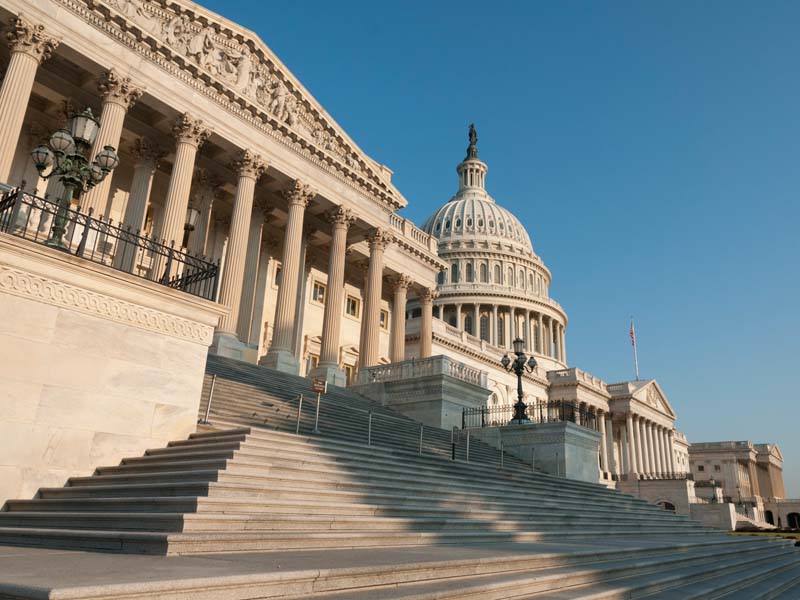Hundreds of AAFP Members Meet With Lawmakers
in D.C.
May 31, 2024, Scott Wilson — Nearly 300 Academy members landed in Washington, D.C., last week for the 2024 Family Medicine Advocacy Summit, meeting with members of Congress to urge legislative support for primary care practices and patients.

The agenda this time was a threefold call on lawmakers to:
- pass the Primary and Virtual Care Affordability Act, which would let individuals enrolled in high-deductible health plans access primary care and telehealth services prior to meeting their deductibles;
- address medical student debt by passing the Resident Education Deferred Interest Act;
- and ensure that all vaccines recommended for adults by the Advisory Committee on Immunization Practices are covered by Medicare Part B.
Part practical-skills bootcamp, part state-of-primary-care workshops and part Capitol Hill blitz, the three-day conference drew plenty of first-timers and impressed veteran attendees.
“The AAFP’s Government Relations team did an incredible job of gathering issues that bring the whole academy together,” said Domenic Casablanca, M.D., FAAFP, of East Hampton, Conn., a longtime FMAS-goer who is on the board of the Academy’s Family Medicine Political Action Committee. “Each of the issues affects our members in different ways — I see a large percentage of Medicare patients and I’m unable to give some vaccines — but all of our asks were right on target.”
Renee Crichlow, M.D., FAAFP, of Brookline, Mass., echoed this impression.
“At this FMAS, it was clear we had all gathered to learn the skills, do the work and build the relationships that will move family medicine forward,” she told AAFP News. “Everywhere we saw each other on the Hill, in our scarves and ties, we re-energized each other. I imagine none of us are left unchanged.”
Just ahead of the event, AAFP EVP and CEO Shawn Martin previewed the Academy’s renewed push to pass the Primary and Virtual Care Affordability Act, writing in Medical Economics that, “as the country grapples with escalating costs of coverage, it’s critical that patients, families and communities can access primary care physicians — free of barriers and free of steep financial costs.”
Martin noted that CDC data show that patients enrolled in high-deductible plans are more likely than those enrolled in traditional preferred provider organization coverage plans to forgo or delay care and to have problems paying medical bills.
Casablanca said his experience bears this out.
“My patients on high-deductible plans clearly put off their care,” he said. “It’s easier here than in some other states to get on Medicaid, but high-deductible plans are bad in every state. Many more patients would benefit if they could see their physicians when they need to and not have their deductible act as a detriment to accessing care.”
Casablanca, who is on the faculty of the Middlesex Hospital Family Medicine Residency Program and is clinical director of its East Hampton office, added that he knows firsthand how medical student debt affects the specialty now and hinders its future.
“I see what my residents carry, their student debt load,” he said, “and the fact that my state’s group was able to bring a resident to FMAS and tell that story was great. Legislative aides tend to listen to residents and students quite closely because they know this is the future of family medicine, and they know their constituents are going to need doctors.”
One such voice this time belonged to Hannah Rayala, a 2026 M.D. candidate at the Brody School of Medicine in Greenville, N.C., who earned an AAFP scholarship to attend her first FMAS.
“One thing that surprised me was how receptive legislative staff were to our requests,” Rayala said. “Many of them agreed that our requests should be commonplace practices and were happy to support the bills we brought up.”
Casablanca heard strong support as well. “All five of the offices we met with uniformly understood issues related to student debt,” he said. “And most of our legislators generally understand and are aligned with the AAFP’s priorities.”
Rayala said she appreciated the crash course in those priorities.
“The policy panel was especially helpful in helping us nuance our request to better fit the current political landscape,” she said. “Throughout the Summit, I learned that advocacy is about building relationships over time and making incremental changes. While it can be frustrating to see slow progress, having a seat at the table is crucial to influence decisions rather than leaving them to others.”
“We understand clearly that the game is long and that the only way positive change will happen is when we play and help others to engage,” Crichlow added. “‘Family Medicine strong’ means something. When we show up, we really can make a difference.”
“There’s something about the whole process that reminds you not just of your responsibility as a physician to patients but also our civic responsibility,” Casablanca said.